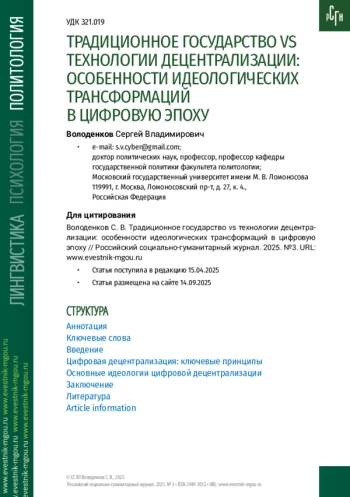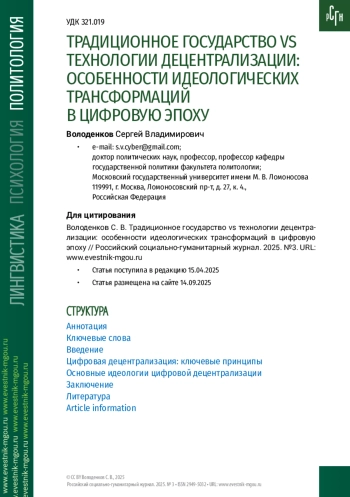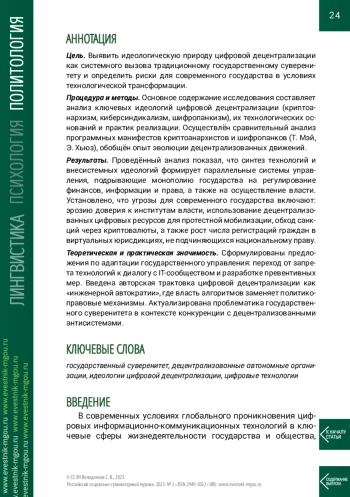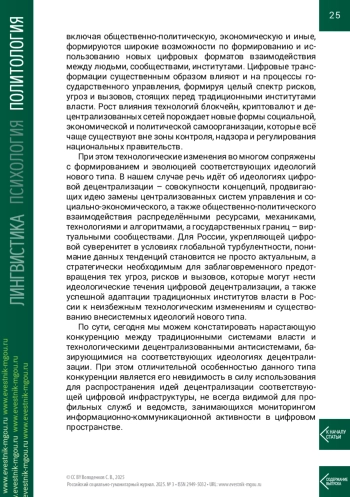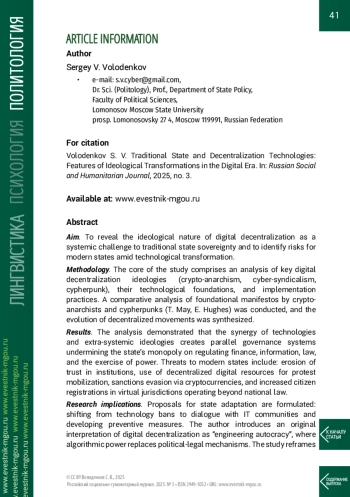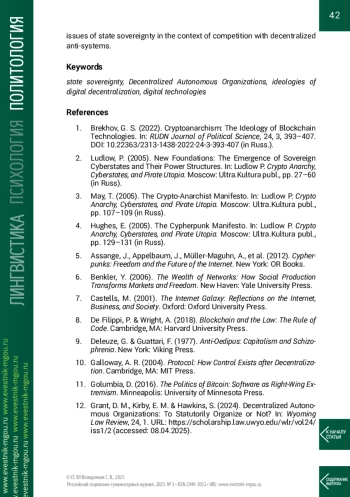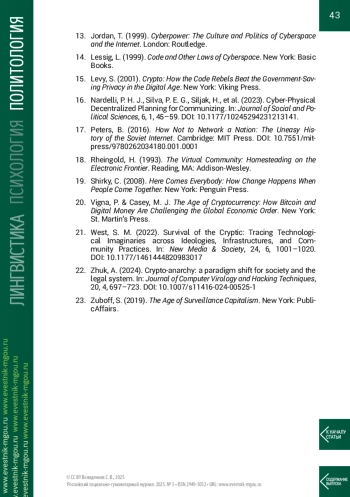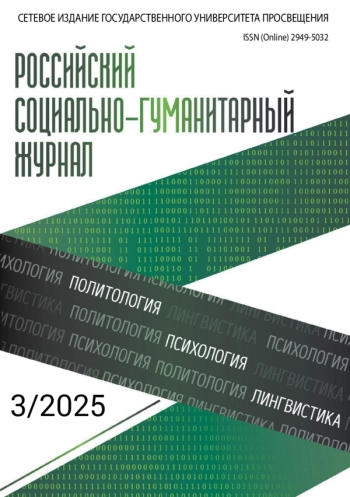Цель. Выявить идеологическую природу цифровой децентрализации как системного вызова традиционному государственному суверенитету и определить риски для современного государства в условиях технологической трансформации.
Процедура и методы. Основное содержание исследования составляет анализ ключевых идеологий цифровой децентрализации (криптоанархизм, киберсиндикализм, шифропанкизм), их технологических оснований и практик реализации. Осуществлён сравнительный анализ программных манифестов криптоанархистов и шифропанков (Т. Мэй, Э. Хьюз), обобщён опыт эволюции децентрализованных движений.
Результаты. Проведённый анализ показал, что синтез технологий и внесистемных идеологий формирует параллельные системы управления, подрывающие монополию государства на регулирование финансов, информации и права, а также на осуществление власти. Установлено, что угрозы для современного государства включают: эрозию доверия к институтам власти, использование децентрализованных цифровых ресурсов для протестной мобилизации, обход санкций через криптовалюты, а также рост числа регистраций граждан в виртуальных юрисдикциях, не подчиняющихся национальному праву.
Теоретическая и практическая значимость. Сформулированы предложения по адаптации государственного управления: переход от запрета технологий к диалогу с IT-сообществом и разработке превентивных мер. Введена авторская трактовка цифровой децентрализации как «инженерной автократии», где власть алгоритмов заменяет политико-правовые механизмы. Актуализирована проблематика государственного суверенитета в контексте конкуренции с децентрализованными антисистемами.
Идентификаторы и классификаторы
- SCI
- Политология
- Префикс DOI
- 10.18384/2224-0209-2025-3-1611
Иными словами, в отличие от классических инструментов и идеологий, технологии цифровой децентрализации не являются нейтральными, но становятся своего рода фундаментом и «бустером» развития соответствующих внесистемных идеологий, а также мультипликаторами потенциала их влияния на массовое сознание.
Список литературы
1. Брехов Г. С. Криптоанархизм: идеология блокчейн-технологий // Вестник Российского университета дружбы народов. Серия: Политология. 2022. Т. 24. №3. С. 393-407. https://doi.org/10.22363/2313-1438-2022-24-3-393-407
2. Ладлоу П. Новые основания: возникновение суверенных кибергосударств и их властных структур // Ладлоу П. Криптоанархия, кибергосударства и пиратские утопии. М.: Ультра.Культура, 2005. С. 27-60.
3. Мэй Т. Криптоанархистский манифест // Ладлоу П. Криптоанархия, кибергосударства и пиратские утопии. М.: Ультра.Культура, 2005. С. 107-109.
4. Хьюз Э. Манифест шифропанка // Ладлоу П. Криптоанархия, кибергосударства и пиратские утопии. М.: Ультра.Культура, 2005. С. 129-131.
5. Assange J., Appelbaum J., Müller-Maguhn A., et al. Cypherpunks: Freedom and the Future of the Internet. New York: OR Books, 2012. 192 p.
6. Benkler Y. The Wealth of Networks: How Social Production Transforms Markets and Freedom. New Haven: Yale University Press, 2006. 656 p.
7. Castells M. The Internet Galaxy: Reflections on the Internet, Business, and Society. Oxford: Oxford University Press, 2001. 456 p.
8. De Filippi P., Wright A. Blockchain and the Law: The Rule of Code. Cambridge, MA: Harvard University Press, 2018. 306 p.
9. Deleuze G., Guattari F. Anti-Oedipus: Capitalism and Schizophrenia. New York: Viking Press, 1977. 400 p.
10. Galloway A. R. Protocol: How Control Exists after Decentralization. Cambridge, MA: MIT Press, 2004. 176 p.
11. Golumbia D. The Politics of Bitcoin: Software as Right-Wing Extremism. Minneapolis: University of Minnesota Press, 2016. 100 p.
12. Grant D. M., Kirby E. M., Hawkins S. Decentralized Autonomous Organizations: To Statutorily Organize or Not? [Электронный ресурс] // Wyoming Law Review. 2024. Vol. 24. No. 1. URL: https://scholarship.law.uwyo.edu/wlr/vol24/iss1/2 (дата обращения: 08.04.2025).
13. Jordan T. Cyberpower: The Culture and Politics of Cyberspace and the Internet. London: Routledge, 1999. 254 p.
14. Lessig L. Code and Other Laws of Cyberspace. New York: Basic Books, 1999. 297 p.
15. Levy S. Crypto: How the Code Rebels Beat the Government-Saving Privacy in the Digital Age. New York: Viking Press, 2001. 352 p.
16. Nardelli P. H. J., Silva P. E. G., Siljak H., et al. Cyber-Physical Decentralized Planning for Communizing // Journal of Social and Political Sciences. 2023. Vol. 6. No. 1. P. 45-59. https://doi.org/10.1177/10245294231213141
17. Peters B. How Not to Network a Nation: The Uneasy History of the Soviet Internet. Cambridge: MIT Press, 2016. 312 p. https://doi.org/10.7551/mitpress/9780262034180.001.0001
18. Rheingold Н. The Virtual Community: Homesteading on the Electronic Frontier. Reading, MA: Addison-Wesley, 1993. 384 p.
19. Shirky C. Here Comes Everybody: How Change Happens When People Come Together. New York: Penguin Press, 2008. 400 p.
20. Vigna P., Casey M. J. The Age of Cryptocurrency: How Bitcoin and Digital Money Are Challenging the Global Economic Order. New York: St. Martin’s Press, 2015. 304 p.
21. West S. M. Survival of the Cryptic: Tracing Technological Imaginaries across Ideologies, Infrastructures, and Community Practices // New Media & Society. 2022. Vol. 24. No. 6. P. 1001-1020. https://doi.org/10.1177/1461444820983017
22. Zhuk A. Crypto-anarchy: a paradigm shift for society and the legal system // Journal of Computer Virology and Hacking Techniques. 2024. Vol. 20. No. 4. P. 697-723. https://doi.org/10.1007/s11416-024-00525-1
23. Zuboff S. The Age of Surveillance Capitalism. New York: PublicAffairs, 2019. 704 p.
Выпуск
Другие статьи выпуска
Цель. В исследовании анализируются французская предложно-именная конструкция со структурной моделью «неопределённый артикль главное существительное + предлог de + нулевой артикль зависимое существительное» и её переводы на близкородственные (испанский, итальянский) и неблизкородственные (русский) языки, включая сравнение профессионального и машинного перевода.
Процедура и методы. Методом сплошной выборки было рассмотрено свыше 200 примеров – словосочетаний из французских произведений и их переводов на испанский, итальянский и русский языки. Для обработки полученного материала в исследовании использовался функциональный анализ языковых единиц. Проведён сопоставительный анализ корпуса текстов с применением методов контекстуального и структурного анализа. Использованы данные профессионального авторского перевода и машинных систем (Google Translate, DeepL, Large Language Models, GPT-4).
Результаты. Установлено, что испанский и итальянский языки сохраняют аналогичную структуру, тогда как русский требует синтаксической трансформации. Выявлены типичные ошибки машинного перевода, такие как избыточный артикль в испанском и некорректный падеж в русском языках.
Теоретическая и практическая значимость. Результаты могут быть применены для дальнейшего изучения артиклевой системы романских языков, для развития сравнительно-сопоставительного языкознания в области способов передачи категории определённости / неопределённости в близкородственных и неблизкородственных языках, для улучшения алгоритмов машинного перевода и методики преподавания романских языков.
Цель. Уточнение понятий имплицитности и эксплицитности семного состава компонентов «сердце», «cœur», «cuore», «heart» во фразеологических оборотах. Выявление и сопоставление семантических связей компонентов «сердце», «cœur», «сuore», «heart» с другими лексемами во французском, итальянском, английском и русском языках, рассмотрение фразеологизма как лингвокультуремы.
Процедура и методы. С помощью комплекса применённых методов, включающих метод анализа словарных дефиниций, синергетический подход, семный анализ, а также сравнительно-сопоставительный метод, устанавливаются сходства, в результате чего делается вывод об универсальности соматической фразеологии, а также различия, обусловленные факторами национальной специфики, которые также освещаются в исследовании с применением диахронно-синхронного подхода.
Результаты. Уточнены понятия имплицитности и эксплицитности семного состава компонентов «сердце», «cœur», «cuore», «heart», входящих во фразеологические обороты и идиомы. Установлены лексико-семантические закономерности, такие как полисемия и вариантность в рамках фразеологизмов, отмечены семантическая консервация, характерная для французского языка, частичная деактуализация в итальянском и английском языках и семантическая редукция в русском языке на примере исследуемых фразеологизмов с компонентом сердце. Установлена культурно-историческая специфика, выраженная как в сохранении, так и в утрате архаичных значений для каждой лингвокультуры.
Теоретическая значимость и практическая ценность. Данный научный поиск дополняет существующие исследования соматической фразеологии, рассматриваются частные случаи её проявления на уровне сопоставления языков, что позволяет внести вклад в том числе и в лингвокультурологию. Результаты предложенного в статье исследования имеют практическую ценность, которая заключается в обогащении лексикографических ресурсов, их использовании в преподавании иностранных языков и переводоведения для акцентирования внимания на лингвокультурных особенностях, так как понимание семантических различий и сходств может способствовать более эффективному взаимодействию между носителями разных культур, а также более точному переводу.
Цель. Изучение научно-практических подходов к переводу антропонима, образованного на основе глюттонической лексики в системе онтолингвистического дискурса.
Процедура и методы. В рамках предлагаемого исследования применены стилистический, лингвокультурологический, контекстуальный, сравнительно-сопоставительный, компонентный, онтолингвистический и переводческий анализ оригиналов антропонимов в детском аудиовизуальном произведении. Используемый в работе междисциплинарный подход реализуется на стыке лингвистической, психолингвистической и когнитивной парадигм.
Результаты. В результате исследования выявлены следующие особенности исследуемой лексической единицы и её перевода: глюттоническая лексика является важной составляющей детского речевого дискурса, что объясняет её рекуррентность в антропонимах (например, имя Peaches или дразнилки Anna-Banana, Lisa-Pizza). Глюттоническая составляющая антропонима несёт важный смысл в передаче образа персонажа, однако она ассиметрично вербализуется в языках оригинала и перевода, приводя к коммуникативным потерям при передаче образа персонажа. Для достижения более точной и полной передачи антропонима предложены и описаны методы использования междисциплинарного подхода.
Теоретическая и практическая значимость. Результаты исследования позволяют внести вклад в изучение феномена антропонима на стыке онтолингвистического, аудиовизуального и глюттонического дискурсов в аспекте переводоведения, а также более полно и точно решать возникающие перед переводчиком практические задачи межкультурной передачи антропонима.
Цель. Рассмотреть проблему высокочастотных оправданных и неоправданных лексических заимствований в современном русском языке, их функционирование, приводящее к эрозии языковой идентичности.
Процедура и методы. Основной метод исследования – корпусный анализ, а также семантический анализ лексических заимствований на основе авторского корпуса и количественный анализ, позволяющие получить данные об основных тенденциях и причинах появления «чужих» слов в языке.
Результаты. На основе проведённого корпусного и семантического анализа охарактеризовано современное состояние процесса заимствования лексики в современный русский язык, дополнено понятие оправданного и неоправданного заимствований, проанализировано явление семантического сдвига заимствованных лексем в разных типах дискурса.
Теоретическая и практическая значимость. Основные результаты исследования обеспечивают дополнение понятия лексического заимствования, особое внимание уделяется понятию неоправданных заимствований, одним из наиболее значимых последствий которых являются языковая инфляция и эрозия языковой идентичности – постепенное вытеснение традиционных языковых форм, что ведёт к изменению культурного кода нации.
Цель. Определить оптимальные способы перевода на немецкий язык русскоязычных контекстов, содержащих инверсию числительного и существительного как специфичное для русского языка средство выражения семантической категории аппроксимации.
Процедура и методы. Посредством контекстуального анализа русскоязычного языкового материала, полученного из русско-немецкого параллельного модуля Национального корпуса русского языка, исчислена контекстуальная семантика использования инверсии числительного и существительного как средства выражения аппроксимации. Для выявления частотности использованных в немецкоязычных переводах аппроксиматоров и их возможной корреляции с контекстуально-семантическими группами русскоязычных контекстов был использован сопоставительный метод.
Результаты. Инверсия числительного и существительного как синтаксический аппроксиматор используется в русском языке для передачи: времени / временного периода; возраста человека; количества (человек / людей, денег, раз и др.); расстояния, температуры, площади. Доказано, что оптимальным способом перевода таких русскоязычных контекстов на немецкий язык является использование лексического аппроксиматора etwa.
Теоретическая и практическая значимость. Публикация вносит определённый вклад в изучение категориальной семантики и специфики средств её выражения в русском и немецком языках с использованием возможностей параллельных корпусов. Раскрыт также дидактический потенциал использования параллельных корпусов в подготовке переводчиков.
Цель. Проанализировать значимость эффективного управления ресурсами образовательных проектов в контексте основных принципов государственной политики России в области образования.
Процедура и методы. Исследование базируется на комплексном анализе действующей Стратегии развития образования до 2036 г. с перспективой до 2040 г.
Результаты. Рассмотрены основные принципы государственной политики России в области образования: гуманизма, приоритета общечеловеческих ценностей, доступности образования и его светского характера – с учётом сложности в управлении ресурсами образовательного проекта. Определены основные факторы, препятствующие эффективному управлению образовательными ресурсами, и предложены возможные пути решения.
Теоретическая и / или практическая значимость. Представленные результаты вносят вклад в развитие теории и практики эффективного управления ресурсами образовательных проектов в контексте основных принципов государственной политики Российской Федерации и могут быть использованы при совершенствовании законодательства в сфере образования, в учебном процессе при подготовке специалистов профильной направленности, а также в практической деятельности.
Цель. Выявить особенности репрезентации палестино-израильского конфликта в 2023–2024 гг. в официальных дискурсах исламского движения ХАМАС и руководства Российской Федерации; дать оценку степени конвергенции или дивергенции их позиций в контексте международного восприятия и политической риторики.
Процедура и методы. Основной метод, применяемый в работе, – критический дискурс-анализ (КДА). КДА позволяет не только деконструировать официальные позиции ХАМАС и России, но и раскрыть, как язык служит инструментом политической стратегии: формирует общественное мнение, легитимирует действия, воспроизводит иерархии власти и идеологические противоречия. Посредством анализа риторики и структуры официальных заявлений представляется возможным выявить стратегии, используемые для убеждения аудитории и легитимации действий сторон в условиях внутриконфликтной динамики.
Результаты. Выявленные сходства и различия в дискурсе негосударственного исламистского движения ХАМАС и Российской Федерации отражают специфику их позиций в системе международных отношений и обусловленность внешнеполитических стратегий различными уровнями ответственности и допустимого риторического пространства. В качестве субъекта международной политики, обладающего суверенитетом и стремящегося к обеспечению стабильного международного имиджа, Российская Федерация вынуждена придерживаться рамок дипломатической коммуникации, тогда как ХАМАС, функционируя вне традиционных норм государственной практики, может использовать более радикализированную и эмоционально окрашенную риторику. Палестино-израильский конфликт продолжает оставаться полем геополитического противостояния как региональных, так и глобальных акторов, которые используют палестинский вопрос в целях продвижения собственных интересов.
Теоретическая и / или практическая значимость заключается в том, что исследование углубляет понимание взаимодействия государственных и негосударственных акторов в контексте международных конфликтов, раскрывая механизмы формирования их дискурса через призму геополитических интересов и идеологических различий. Анализ официальных заявлений ХАМАС и Российской Федерации демонстрирует, как разнородные субъекты (негосударственная радикальная организация и суверенное государство) могут конвергировать в критике внешней политики третьих стран (например, США и Израиля) при сохранении принципиальных различий в риторике и стратегиях. Это позволяет расширить существующие теоретические рамки, объединяя подходы к изучению политического дискурса, геополитики и идеологии, а также вносит вклад в методологию сравнительного анализа дискурсов.
Цель. Выявить концептуальные теоретические основы и практические механизмы реализации современного неоколониализма в условиях глобальных цифровых трансформаций.
Процедура и методы. В рамках работы проанализирован корпус научных работ, посвящённых традиционному неоколониализму, цифровому суверенитету и технологической зависимости, с использованием сравнительно-исторического, системного и семантического методов анализа академических дискурсов.
Результаты. Систематизированы ключевые теоретические подходы к изучению цифрового неоколониализма (технологический детерминизм, мир-системная теория, информационное общество и дата-колониализм). Выявлены практические механизмы цифрового неоколониализма, включая контроль над цифровой инфраструктурой, данными и стандартами, ограничивающие суверенитет стран.
Теоретическая и практическая значимость. Результаты дополняют теорию цифрового неоколониализма в современных условиях технологического развития и могут применяться при разработке национальных стратегий цифрового суверенитета, нормативно-правовом регулировании, подготовке специалистов по российской цифровой политике, а также использоваться органами власти для обеспечения независимости отечественного цифрового пространства.
Цель. Статья посвящена методологическому аспекту проблемы исследования нарративов массового сознания.
Процедура и методы. Методика применения веб-аналитического инструментария в рамках социально-политических исследований феноменов массового сознания и технологий их формирования рассматривается на примере анализа сферы ценностного нарратива. Семантической темой веб-аналитического мониторинга в статье выступает сфера государственной семейной политики и её отражение в эмпирических показателях сетевой активности пользователей в русскоязычном пространстве сети Интернет. Для построения выводов об уровне общественного интереса вводится понятие «эмпирические показатели сетевого нарратива» как дискурсивной суммы трёх групп веб-аналитических показателей: официального нарратива, нарратива СМИ и общественного нарратива.
Результаты. По результатам мониторинга делаются выводы о взаимосвязи различных нарративов, затрагивающих вопросы ценностей и формирование образа государственной политики. Общественный нарратив в целом следует за нарративом СМИ, но не определяется им. Формируя собственный нарратив, крупнейшие информагентства ориентируются в первую очередь на заявления официальных лиц и публикации официальных информационных источников политической власти. В свою очередь, более мелкие, в особенности региональные, СМИ склонны ориентироваться преимущественно на общественный запрос, общественный интерес к теме. Охват СМИ кратно превосходит возможности социальных сетей в тех случаях, когда они опираются на официальный нарратив. Однако как только официальный нарратив ослабевает или переключается на другую повестку, мелкие СМИ и социальные медиа получают преимущественное влияние на аудиторию.
Теоретическая значимость. Авторами предлагается модель применения специализированного веб-аналитического инструментария для задач сбора и первичной обработки эмпирических данных при исследовании общественных нарративов в сети Интернет.
Цель. Систематизация исследований российских авторов, специализирующихся на вопросах изучения наиболее эффективных механизмов и методов контрсанкционной политики России в области энергетики.
Процедура и методы. В представленном исследовании автором был проведён анализ взглядов отечественных учёных – представителей различных социально-гуманитарных дисциплин, предлагающих своё видение противодействия ограничительным мерам недружественных стран.
Результаты. По итогам исследования сделан вывод, что работы отечественных учёных можно подразделить на смысловые группы, образованные по принципу схожего набора механизмов и мер, нацеленных на относительно безболезненный обход Россией режима санкций, введённых недружественными странами.
Теоретическая и практическая значимость. Предложена классификация подходов к контрсанкционной деятельности России в сфере энергетики, среди которых выделяются приоритетно-технологический, дипломатический и комплексно-институциональный. Согласно выводам, представленным в итоговой части данной работы, санкционное воздействие требует постоянного изучения и всестороннего междисциплинарного рассмотрения ввиду сложности и комплексности проблематики. По своей сути механизмы и методы противодействия санкциям недружественных стран не могут в полной мере быть охарактеризованы как специфические и экстраординарные мероприятия. В этой связи автор приходит к выводу, что отечественные исследователи склонны придерживаться точки зрения, согласно которой противодействие санкциям недружественных стран реализуется посредством адаптации корпоративных и государственных систем, а также корректировки уже известных институционально оформленных мер, реализуемых применительно к актуальной ситуации, складывающейся ввиду возрастающего давления на отечественный топливно-энергетический комплекс
Цель. Выявить особенности влияния Специальной военной операции на общероссийскую гражданскую идентичность.
Процедура и методы. Ключевым исследовательским методом стал вторичный анализ социологических данных. Проведён анализ представлений россиян о гражданской идентичности, также в оптике концепции трансформирующей агентности изучены гражданские движения и организации, ведущие общественно-политическую деятельность.
Результаты. Сделан вывод, что СВО создала условия для появления новых форм гражданской идентичности. Показано, что низовая инициатива становится драйвером возникновения и роста новых институциональных структур гражданского взаимодействия и помощи государству. Вместе с тем отмечен риск конфликта между новыми институциональными структурами и государственными органами на фоне сохраняющейся проблемы социального неравенства и запроса на реформы.
Теоретическая и/или практическая значимость заключается в обосновании релевантности концепции трансформирующей агентности для изучения социально-политических трансформаций современного российского общества.
Цель. Выявить и показать концепт парламентаризма как интегрирующего фактора русской государственности, разрабатываемый в нарративах публицистики представителей идеологии сибирского демократического регионализма (областничества) в начале ХХ в.
Процедура и методы. На основе инструментария политической текстологии анализу подвергаются письменные нарративы политической дискуссии о развитии представительных органов Сибири и всей Азиатской части России. Гносеологическую роль для познавательных замыслов сыграла также методология «новой политической истории», которая позволяет направить дискурсивный анализ на общественные группы.
Результаты. Установлено, что в начале ХХ в. активизировался нарратив о перспективах развития законосовещательных и представительных органов в периферийных и окраинных территориях нашего Отечества. Дискурс имел концептуальное и системное содержание. Складывалась чёткая холистическая схема: с учреждением и развитием земства как формы местного самоуправления активно будут формироваться и эффективно действовать легислатуры на уровне регионов, что позволит учитывать истинные проблемы территориальных образований на уровне единого общероссийского парламента.
Теоретическая и практическая значимость. Результаты исследования могут способствовать развитию изучения отечественной политической мысли дореволюционной России, в которой наследие сибирских областников пока представлено фрагментарно. Значение для укрепления основ русского государственного строя могут иметь парадигмальные концепты учения демократических регионалистов, согласно которым парламентаризм, местное самоуправление и федерализм имеют интегрирующее начало отечественной государственности.
Цель. Выявление специфики исторических этапов государственной стратегии Туркменистана по реформированию высшего образования.
Процедура и методы. Проведены качественный анализ нормативных правовых актов и статистических данных, экспертный опрос.
Результаты. В политической истории развития государственной политики в сфере высшего образования независимого Туркменистана выделяется два этапа, особенности которых определяются личными предпочтениями президентов. Первый этап приходится на период правления С. Ниязова в 1991–2006 гг. и характеризуется укреплением таких сложившихся в позднесоветский период негативных черт, как жёсткая централизация и закрытость высшего образования для большинства граждан, которые происходят на фоне общего упадка. Второй этап приходится на правление Г. Бердымухамедова и его сына С. Бердымухамедова и характеризуется относительными подъёмом высшей школы, её оформлением в компактную модель, отвечающую интересам правящей группы, а также формированием относительно явного курса на интернационализацию и ориентации на стандарты и принципы Болонского процесса. Вместе с тем сохраняются жёсткая централизация и закрытость высшего образования.
Теоретическая и/или практическая значимость заключаются в концептуальном обобщении новых данных о высшей школе Туркменистана, в рекомендациях по оптимизации высшего образования Туркменистана и в авторском прогнозе дальнейшего развития системы высшего образования Туркменистана.
Статистика статьи
Статистика просмотров за 2025 - 2026 год.
Издательство
- Издательство
- Просвет
- Регион
- Россия, Москва
- Почтовый адрес
- 141014, Московская область, г.Мытищи, ул.Веры Волошиной, д.24
- Юр. адрес
- 141014, Московская область, г.Мытищи, ул.Веры Волошиной, д.24
- ФИО
- Кокоева Ирина Александровна (ИСПОЛНЯЮЩИЙ ОБЯЗАННОСТИ РЕКТОРА)
- E-mail адрес
- info@guppros.ru
- Контактный телефон
- +7 (849) 5780094
- Сайт
- https://guppros.ru/
